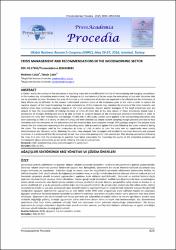| dc.contributor.author | Çolak, Mehmet | |
| dc.contributor.author | Çetin, Tahsin | |
| dc.date.accessioned | 2020-11-20T15:03:55Z | |
| dc.date.available | 2020-11-20T15:03:55Z | |
| dc.date.issued | 2016 | |
| dc.identifier.issn | 2459-0762 | |
| dc.identifier.uri | https://doi.org/10.17261/Pressacademia.2016118683 | |
| dc.identifier.uri | https://hdl.handle.net/20.500.12809/2802 | |
| dc.description | Global Business Research Congress (GBRC) - MAY 26-27, 2016 - Istanbul, TURKEY | en_US |
| dc.description | WOS: 000460870800062 | en_US |
| dc.description.abstract | In today's world, the survival of the enterprises is becoming more and more difficult in the face of the escalating and changing competition. In the modern-day competitive environment, fast changes in the environmental factors cause the enterprises to face with situations that can be described as crisis. Whatever the scale of the crisis is, the enterprises of all sizes are expected to be affected but the dimensions of these effects can be different. In this respect, institutional practices aimed at the employees prior to the crisis in order to reduce the negative impacts of the crises threatening the aims and existence of the enterprise may minimise the impacts of the crisis.Economic and sectoral crises have numerous negative impacts on the small enterprises. Owners and/or managers of the small enterprises who are obliged to take the responsibility of making decisions at times of crises due to the very nature of these enterprises should have a perspective of strategic thinking and should be able to make an accurate analysis of the internal and external environments in order to overcome the crisis with minimal loss and damage. To this end, in this study, surveys were applied to 96 woodworking enterprises that were operating as SMEs in a variety of cities of Turkey and were selected via simple random sampling though personal and face-to-face interviews with the executives of the enterprises and the obtained data were analyzed through SPSS package program.The present study reveals that the enterprises operating in the woodworking sector take precautions against the crises following the crises instead of during the crises. The strategies used by the enterprises at times of crisis in order to turn the crisis into an opportunity were mainly advertisements and discounts while, following the crisis, they changed their strategies and decided to continue discounts and adopted incentives. It is understood that the enterprises do not have precaution packages for crisis periods but they develop precautions following the crisis. It is seen that the enterprises in question have taken precautions for improving the quality of the innovative products and increasing the labour productivity as well as for reducing the costs in such periods. | en_US |
| dc.item-language.iso | tur | en_US |
| dc.publisher | Pressacademia | en_US |
| dc.relation.ispartofseries | Pressacademia Procedia | |
| dc.item-rights | info:eu-repo/semantics/openAccess | en_US |
| dc.subject | SME | en_US |
| dc.subject | Woodworking | en_US |
| dc.subject | Crisis | en_US |
| dc.subject | Crisis Management | en_US |
| dc.subject | Production | en_US |
| dc.title | CRISIS MANAGEMENT AND RECOMMENDATIONS IN THE WOODWORKING SECTOR | en_US |
| dc.item-type | conferenceObject | en_US |
| dc.contributor.department | MÜ, Teknoloji Fakültesi / Ağaç İşleri Endüstri Mühendisliği Bölümü | en_US |
| dc.contributor.institutionauthor | Çolak, Mehmet | |
| dc.contributor.institutionauthor | Çetin, Tahsin | |
| dc.identifier.volume | 2 | en_US |
| dc.identifier.startpage | 620 | en_US |
| dc.identifier.endpage | 628 | en_US |
| dc.relation.journal | Global Business Research Congress (Gbrc) 2016, Vol 2 | en_US |
| dc.relation.publicationcategory | Konferans Öğesi - Uluslararası - Kurum Öğretim Elemanı | en_US |


















